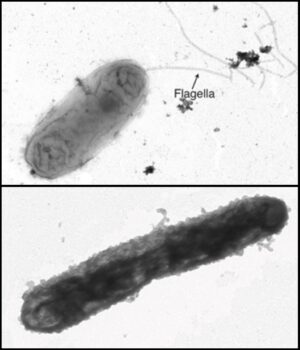Berkeley Lab researchers uncovered a distinctive adaptation that some bacteria use to quickly form protective communities called biofilms, which help them survive in adverse environments. The work could yield insights for managing areas with high levels of heavy metals, nutrients, or other forms of hazardous waste.

Pollution in surface water and groundwater is a growing global issue, disrupting natural systems and impacting both wildlife and human health. Understanding how different microorganisms function to cycle nutrients through the environment and maintain healthy ecosystems is a key aspect of addressing these challenges. Notably, the bacterial species Rhodanobacter has a documented resilience against high levels of heavy metals and acidity, and plays a particularly crucial role in removing excessive nitrate from groundwater.
The team of ENIGMA researchers led by Mingfei Chen, a postdoctoral scholar in Ecology Department Head Romy Chakraborty’s group, was interested in how Rhodanobacter adapt to these stressors. In their recent study, the team investigated growth and stress response of biofilms formed by different Rhodanobacter strains across varied nutrient, pH, nitrate, and metal conditions. They found that aluminum stress increased biofilm growth while promoting flagella loss.
The finding not only underscores Rhodanobacter‘s specialized resilience in these extreme environments, but also provides a fresh insight as to how biofilms form. The researchers anticipate that these findings could extend beyond Rhodanobacter to provide a broader understanding of microbial adaptation.
Read more on the Biosciences Area website.
Contact

Mingfei Chen, Postdoctoral Fellow, Climate & Ecosystems
Lawrence Berkeley National Laboratory
MingfeiChen@lbl.gov
Funding
This project was funded by ENIGMA’s internal Discovery program under short-term research projects exploring new themes or technical capabilities. These proposals, which are submitted by early career researchers as professional development opportunities, are internally reviewed and funded based on merit and potential impact.
Publication
Chen, M.; V.V. Trotter, P.J. Walian, Y. Chen, R. Lopez, L.M. Lui, T.N. Nielsen, R.G. Malana, M.P. Thorgersen, A.J. Hendrickson, H. Carion, A.M. Deutschbauer, C.J. Petzold, H.J. Smith, A.P. Arkin, M.W.W. Adams, M.W. Fields, R. Chakraborty (2024) Molecular mechanisms and environmental adaptations of flagellar loss and biofilm growth of Rhodanobacter under environmental stress. The ISME Journal. [DOI]: 10.1093/ismejo/wrae151 OSTI: 2460472
